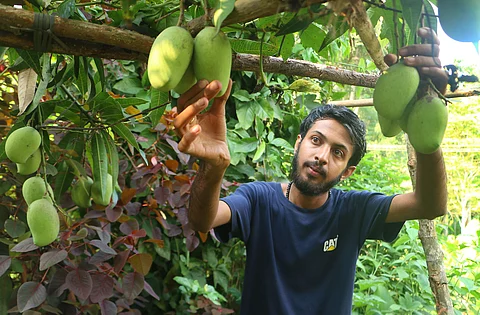

The mother planted each tomato seed carefully in the soil, while the son stood next to her. He watched her curiously. From that day, he accompanied her every day to the backyard to watch the seed grow into a plant and finally, give them tomatoes. While the mother watered the plants and nurtured them with manure from time to time, he observed everything carefully. He also made it a point to help her out in every possible way.
And then one day, at the age of 13, he planted a few tomatoes and string beans, next to his mother’s plants. The yield was impressive that year and he was adamant on continuing farming. This is how 22-year-old Sooraj CS began his journey in agriculture, nine years back. Today, this BSc Agriculture student cultivates different varieties of vegetables, rice and fruits like avocado, lychee and passion fruit in his four and a half acres of land. What is so unusual about it, you may wonder. This young farmer, who resorts to methods of organic farming has never used pesticides in his entire farming career. Not just that, he constantly campaigns against the use of pesticides and conducts awareness classes on organic farming, promoting the use of eco-friendly alternatives to pesticides.
“Plants mainly need micronutrients to grow. They also need potassium and phosphorus, but these can be absorbed only in a soluble form. To facilitate this, we can introduce microorganisms to the soil, instead of using chemical fertilisers,” says Sooraj, adding, “Many people think that using fertilisers is an easy solution to get a good yield. In fact, they’re conditioned to believe so. But that isn’t true. We have a lot of eco-friendly alternatives.”
So, what are those alternatives, we asked. “Adding a lot of organic matter may be time-consuming and difficult. But there are simpler ways too. For instance, there is green manuring (leaving parts of uprooted crops on a field), which is quite a simple task. Plants like sesbania can be used for it,” he says. Sooraj’s interest in chemical-free farming began after he attended a lecture by agriculturist Subhash Palekar, back in class X. “I developed a lot of contacts there. All of us continued discussing our innovations. By then, I was so passionate about farming that I spent all my time researching novel ways to grow plants and crop,” he says.
Interacting with farmers over the years, Sooraj also understood more about the toxic (pun intended) relationship between farmers and pesticides. He tells us more. “Nitrogen is necessary for a plant’s growth. Therefore, providing urea in large quantities will result in instant and unnaturally high yield. But, there is a downside. This makes the plant more prone to pest attack. This is mainly because of the chemical imbalance in the soil caused by urea,” he explains, as we listened curiously.
This is when usually a farmer uses pesticides. Pesticides are of two main types — contact and systemic. While the former kills the pests by coming in contact with its body, the latter is absorbed by the plant. “For instance, if there is a pest attack in the root, you just have to spray the pesticide on the leaf and the plant absorbs it. There is no use of washing the vegetables grown by this plant if they’re harvested before the recommended time period, as they’re already poisonous. But unfortunately, most farmers harvest really early,” he says.
But this isn’t the end. “It spoils the soil quality. It affects the ecological balance too. Not just that, some pests have now become resistant to pesticides,” he says, adding, “Recently, we heard of how people died just by smelling pesticides. It’s high time that we need to start using alternatives. There are a lot of biological methods to control pests. If the government gives a greater push to them, we can save the plants and the planet to a large extent.”
This Community in Kerala will push you towards sustainable living
This youth group is cleaning Bengaluru up big time. Here's why
Earth CoLab is calling all earthlings to join hands for the environment
Meet the Karnataka-based environmentalist who's saving our rivers so that we don't run dry
